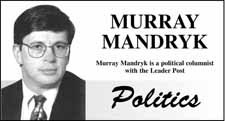Whether you think this federal election is about ethics or the economy is likely telling you a lot about how you are going to vote.
This is by no means a proof-positive determining test. After all, years of the Sponsorship Scandal and other issues have certainly told a lot of voters that Liberals don't exactly hold the monopoly on ethics issues.
Similarly, the Conservatives' decision to stake out the high ground on fiscal prudence and strong economic management is a little amusing after five-years of big spending (5.1-per-cent a year at a time when government was losing revenue to tax cuts) and rapidly rising federal debt. Certainly, their record pales in comparison to the fiscal success of the previous Liberal governments when Paul Martin and Ralph Goodale were finance ministers.
That said, political parties make their choice in any given campaign as to what issues will be theirs and the Conservatives have clearly staked out the fiscal management issue while the Liberals and NDP have staked out the ethics issue.
The outcome of this election now rests on which issue voters find more relevant to them.
It is also for this reason that Prime Minister Stephen Harper is suddenly looking like he may get his long-sought-after majority.
If the early opinion polls mean anything, it looks like we are headed to towards a Conservative majority. Initially polling showing a 17- to 14-percentage point lead could certainly be enough to provide the Tories with a thin majority.
Admittedly, polls can be wrong or voters' intentions can change their minds in a long federal campaign. But as it stands right now, it appears the NDP and especially Michael Ignatieff's Liberals have massively misread the public mood.
Perhaps voters aren't exactly enamoured with the sometimes-autocratic style of Stephen Harper.
Perhaps voters might event want like a federal government more willing to work with the opposition and less inclined to fits of arrogance or political gamesmanship. After all, it's not as if the NDP and Liberals don't have a good to be frustrated with the games the Harper Tories play in Ottawa that are befitting of the Pierre Trudeau-Jean Chretien era. And all Canadians have very good reason to be concerned about the mounting Conservative scandals.
But the problem for the Liberals and the NDP is that today's Canadians - especially rural, Western Canadians - do make their own assessment as to how the issues and how relevant these issues are to them. Parties may make first claim to the issues they see as important, but it is the voters that have the final say as to who made the right selection.
In fact, with three elections in the last five and years and four federal elections in the past seven years, voters may be savvier than ever. They have become very good at weighing the relevance of scandals against other issues that effect their lives.
Votes look like they have already seem to have made their assessment. They caught a brief glimpse of the budget and liked what they saw. They seemed relatively satisfied with the economy and the running of Parliament. And, most pertinently, they weighed the issue of ethics and contempt of Parliament as not significant enough to force an election.
The opposition parties chose to ignore these warning signals and forced this election, anyway.
And unless the NDP and Liberals can somehow convince the voters that their issues should matter more than the economy and getting on with the business of running the country, it's unlikely the polling will change.
The problem for the NDP and Liberals is that the Conservatives may have figured out what's most important to voters long before the opposition parties did.
Murray Mandryk has been covering provincial politics for over 15 years.




